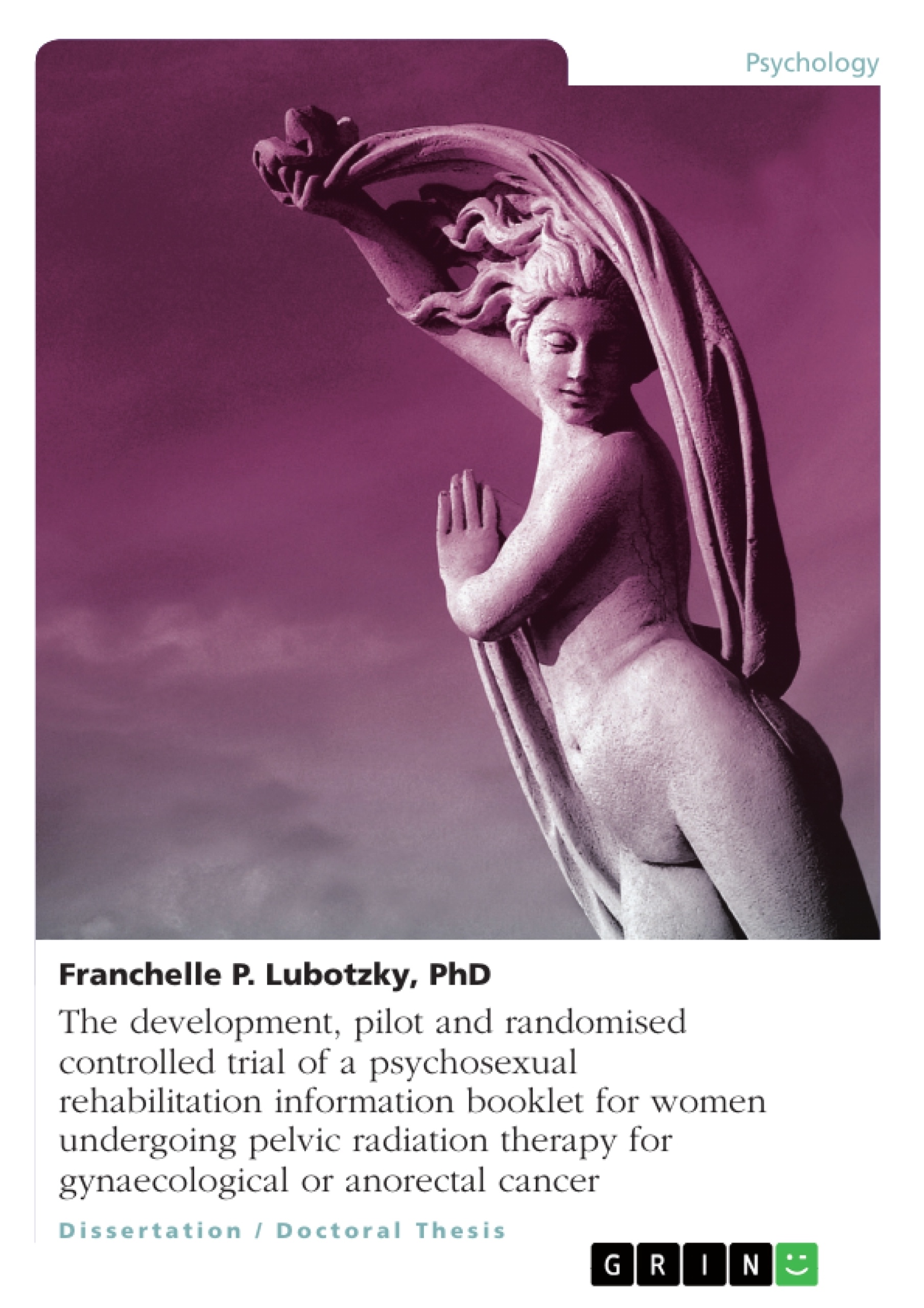Thias study entailed the development (Phase I), pilot (Phase II) and randomised controlled trial (RCT) (Phase III) of a psychosexual information booklet for women undergoing pelvic radiation therapy (PRT) for gynaecological or anorectal cancer. This was undertaken due to the high prevalence of psychosexual morbidity following PRT, and the lack of existing resources to facilitate recovery and reduce distress.
The psychosexual information booklet was developed based on the literature, input from an expert multi-disciplinary advisory group, and published standards in developing information materials for cancer consumers.
After the booklet development, a mainly qualitative retrospective pilot study was conducted which explored: a) women’s experiences and rehabilitation informational needs following PRT; b) the feasibility and acceptability of providing women with an information booklet about radiation-induced side effects potentially affecting recovery, and especially sexual functioning/vaginal changes; and c) assessed the acceptability of a measurement protocol that would be used in a later RCT. The pilot highlighted many challenges to quality of life faced by women after PRT, and revealed diverse informational needs, particularly regarding sexual rehabilitation. Overall, the pilot findings provided support for the provision of a psycho-educational resource to better support women in physical and psychosexual rehabilitation following PRT, as well as some guidance regarding improving the format of the booklet. The pilot booklet was revised based on participant feedback, as well as the recent Cochrane Review (Johnson & Miles, 2010) findings regarding vaginal dilator use. Given the high levels of acceptability of the pilot psychosexual booklet, its effectiveness was then prospectively evaluated in a multicentre randomised controlled trial (RCT).
The longitudinal quantitative RCT assessed whether the psychosexual booklet improved adherence to recommended rehabilitation strategies (dilator use, vaginal lubrication and pelvic floor muscle exercises), improved knowledge, lowered levels of anxiety, depression and PRT-related psychological distress and improved sexual activity, function and satisfaction post PRT. The RCT demonstrated that the psychosexual booklet improved knowledge and vaginal dilator use.
Inhaltsverzeichnis (Table of Contents)
- Introduction
- Literature Review
- Psychosexual Concerns following Pelvic Radiation Therapy
- Psychosexual Rehabilitation
- Information and Support
- Previous Research
- Methodology
- Pilot Study
- Randomised Controlled Trial
- Results
- Pilot Study
- Randomised Controlled Trial
- Discussion
- Conclusion
Zielsetzung und Themenschwerpunkte (Objectives and Key Themes)
This thesis explores the development, pilot testing, and evaluation of a psychosexual rehabilitation information booklet for women undergoing pelvic radiation therapy for gynecological or anorectal cancer. The research aims to address the significant psychosexual concerns experienced by women undergoing this treatment and to provide a practical resource to support their recovery.
- The impact of pelvic radiation therapy on women's psychosexual health.
- The importance of psychosexual rehabilitation in cancer care.
- The effectiveness of an information booklet in addressing psychosexual concerns.
- The role of patient education and self-management in improving psychosexual well-being.
- The development and evaluation of a tailored intervention for a specific patient population.
Zusammenfassung der Kapitel (Chapter Summaries)
The introduction sets the stage for the research by outlining the significance of psychosexual concerns following pelvic radiation therapy and the need for effective interventions. The literature review delves into the existing knowledge on psychosexual issues, rehabilitation approaches, and the role of information and support for women undergoing this treatment. The methodology chapter details the development of the information booklet, the pilot study, and the randomized controlled trial. The results section presents the findings from both the pilot and the main study, highlighting the effectiveness of the booklet in addressing psychosexual concerns. The discussion chapter analyzes the results and explores the implications for clinical practice and future research.
Schlüsselwörter (Keywords)
Psychosexual rehabilitation, pelvic radiation therapy, gynecological cancer, anorectal cancer, information booklet, patient education, self-management, quality of life, sexual function, psychological distress.
Frequently Asked Questions
What is the purpose of the psychosexual rehabilitation information booklet?
The booklet was developed to support women undergoing pelvic radiation therapy (PRT) by providing information on side effects, facilitating recovery of sexual function, and reducing psychological distress.
Which patient groups were the focus of this study?
The study focused on women undergoing pelvic radiation therapy for either gynecological or anorectal cancer.
What are the common psychosexual concerns after pelvic radiation therapy?
Common concerns include vaginal changes, loss of sexual function, anxiety, depression, and distress related to the physical side effects of radiation.
Did the randomized controlled trial (RCT) prove the booklet's effectiveness?
Yes, the RCT demonstrated that the booklet improved patients' knowledge and increased adherence to recommended rehabilitation strategies, such as the use of vaginal dilators.
What rehabilitation strategies are recommended in the booklet?
The booklet recommends strategies including the use of vaginal dilators, vaginal lubrication, and pelvic floor muscle exercises.
- Citar trabajo
- Franchelle P. Lubotzky (Autor), 2015, The development, pilot and randomised controlled trial of a psychosexual rehabilitation information booklet for women undergoing pelvic radiation therapy for gynaecological or anorectal cancer, Múnich, GRIN Verlag, https://www.grin.com/document/337610



